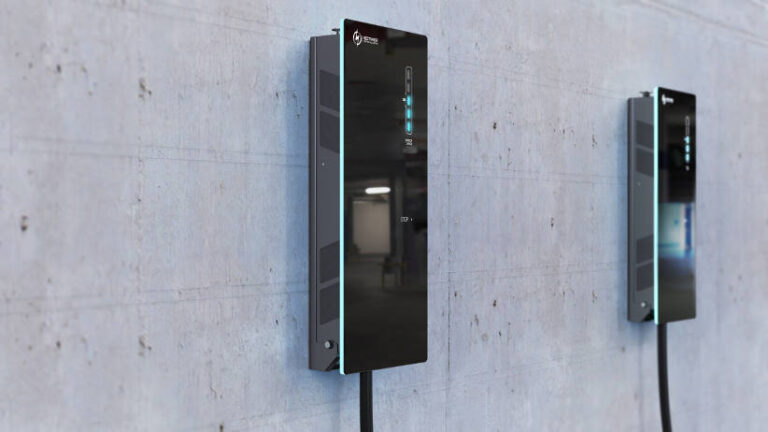At the 2019 AfMA conference the opening Keynote address shared some of the learnings on EVs and hydrogen vehicles from Europe. The statement we remember in the FAN office most was, ‘Don’t worry about the infrastructure, it will come.” We were reminded of this again when this press releases landed in our inbox during August.
Australian power conversion technology specialists Rectifier Technologies (ASX: RFT) has unveiled its bi-directional DC Electric Vehicle (EV) charger, the Highbury DC Bi-directional Charger.
The 7kW charger – named after the company’s R&D headquarters on Highbury Road in Melbourne – is the world’s slimmest bi-directional DC charger and is ideal for garages or car ports. It measures just 123mm/4.84 inches in depth from the back to the front, ensuring homeowners can install the charger in tight spaces and can be mounted to a wall.
The charger is easy to install and, when set up for home use, begins charging the electric vehicle once it is plugged in.
“The Highbury is unobtrusive and has been designed to fit most aesthetics, while being cost-effective for electric vehicle owners,” said Paul Davis, Operation Manager, Rectifier Technologies. “There’s no complication in using the Highbury; it just works.”
Further, its bi-directional capability allows the Highbury to funnel excess power from the batteries of vehicle-to-grid (V2G)-enabled electric vehicles, such as the Nissan Leaf, back to the grid. The high efficiency Highbury charges with the CHAdeMO plug standard and will ultimately also be able to charge with CCS compliant EVs. Both versions comply with all relevant Australian standards.
Homeowners will be able to sell excess power back to utilities during peak periods but will also be able to power their own homes and reduce their reliance on the grid. The company is making its Highbury available to trial program coordinators and utilities operators, such as Australian energy providers, to demonstrate its bi-directional system operations and how it can enable EV owners to support the electricity grid and ultimately be able to power their homes and some commercial sites.
“We are now looking for trial operators in Australia to test how our Highbury and its bi-directional capability can benefit them and work as part of a wider grid featuring myriad energy resources,” said Davis.
Certified versions of the Highbury are expected to be available at the end of 2021.
Putting power back in the driver’s seat with bi-directional V2G capability
By simply having their V2G capable electric vehicle plugged in, owners can leverage the Highbury’s bi-directional capability to shave money off their electricity bill. Owners could earn revenue by selling energy back to the grid during peak demand or offering ancillary services through virtual power plant operators.
“Drivers will be able to re-charge their vehicles when off-peak energy is being funnelled through the grid, and they could do so at home, at work or even on the road with public charging infrastructure,” said Davis.
“When feed-in tariffs are highest during heavy demand or the grid is experiencing a destabilising event, the Highbury can rapidly react to export energy and earn a return which offsets the cost of the electricity consumed.”
“The Highbury will bring to the market a flexible approach to how people can financially benefit from the grid, while utilities will also benefit as electric vehicles can act as a dispersed power storage network.”
“It just works”: Built and designed with EV owners and their garages in mind
Designed for wall mounted installation, the Highbury is ideal for garages and carports. An embedded LED strip indicates the status of the charger; for example, a blue light will pulse when charging the vehicle. In addition, the state-of-charge indicator on the front panel shows charging progress.
According to Davis, the Highbury was designed with the end-user and their needs in mind.
“We want EV owners to be able to use this quickly and easily; when they plug it in, they don’t want to have to go through multiple stages simply to charge their vehicle,” he said. “They’ll be able to plug it in and it will begin charging. It just works.”
Further, the 7kW single-phase bi-directional DC charger is only the first step in the overall Highbury roadmap.
“The roadmap includes more features for owners such as V2H (vehicle-to-home) operation, which will help to enable energy self-reliance and even home power backup,” he said. “The roadmap also includes an 11kW, three-phase Highbury for faster charging and greater export power for commercial owners.”






